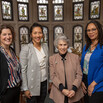Solomon Center Fellow Spotlight: Hil Moss

When Solomon Center Student Fellow Hil Moss (SOM/YSPH ’22), began her graduate work at Yale School of Management in 2018, she anticipated continuing work in the business and strategy of arts and culture. That all changed when she was diagnosed with breast cancer about six weeks into her program.
Now she is the Co-Founder and CEO of VivorCare, the first virtual survivorship clinic for cancer survivors. VivorCare is dedicated to the health and care of those who have survived cancer.
When Moss was diagnosed, she became active in the “cancer world.” She immersed herself in online communities, writing, mentoring, and doing advocacy work around cancer. Her experience informed how she thought about cancer care. Moss was struck by the way survivors of cancer received treatment.
“After exiting the active treatment phase of cancer care, patients then felt like they were thrown out to the wolves,” Moss said.
Cancer survivors may experience unique short and late effects of cancer treatment, including cardio toxicity, bone density loss, neuropathy, chronic pain, sexual dysfunction, and sleep dysfunction. They also face significant mental health issues, especially what is known as fear of cancer recurrence. Adding to these problems are the strains their health care providers experience. Oncologists face physician burnout, workforce development and training challenges, and other issues. Similarly, primary care physicians who oversee patients with complex and serious illness are under pressure to provide high levels of consistent care.
Moss explained how all of these conditions have created the need for another type of service for survivors of cancer.
“By 2025 the growth in demand for oncology services is going to outstrip the growth of the number of oncologists. Meaning that the old world, where an oncologist could continue to care for their few survivors long-term, is no longer tenable,” Moss said. “So cancer survivors get pushed out of the active cancer care ecosystem and the question is, where do they land? In an ideal world they’d land in primary care, but what we’ve seen in the research is that a significant portion of primary care physicians do not feel comfortable handling a survivor … This is something we at VivorCare call the ‘survivorship gap:’ we have a high-risk, high-cost, high-complexity population going somewhat unmanaged.”
By the time she returned to Yale, Moss’s interests had shifted. She began consulting with health care companies across the industry. When Moss realized she wanted to think bigger about the systems that impact cancer care, she enrolled in the Yale School of Public Health in addition to the School of Management. During her time at Yale, Moss authored a publication on the “over-corporatized” approach to Breast Cancer Awareness Month and was active in entrepreneurship teams and communities. She also co-chaired the 2022 Yale Healthcare Conference, which featured patient entrepreneurs who spoke about patient-centered innovation.
Moss said Yale was a great place to kickstart her vision for VivorCare. She appreciated the connections the Solomon Center made while she was developing the concept for her company.
“There have been extraordinary advocates on our side, including both Abbe [Gluck, Faculty Director] and Katie [Kraschel, Senior Advisor] from the Solomon Center,” Moss said. I told them about this big idea that I had. They connected me with so many amazing, high profile folks in the field which I was so grateful for. It was incredibly valuable to be part of that group and be one of the Solomon Center liaisons with the Business School,”
Kraschel said that Moss is “a great example of a student who took full advantage of her student fellowship with the Solomon Center, and I’ve no doubt we will hear more about her work for years to come.”
While still in her final year of graduate school, Moss worked across Yale’s School of Management, School of Public Health, and Tsai CITY to co-found her company and began thinking critically about long-term care for survivors to fill the survivorship gap. As soon as Hil graduated in 2022, she jumped into her new role as a fulltime co-founder and CEO. She began speaking with as many survivors as possible and soon realized that to bridge that survivorship gap, VivorCare had to be more comprehensive than a mobile app or website.
With her co-founder, Justin Grischkan, MD, Moss built out a new model for virtual clinical care. The model is designed to transition cancer patients more effectively into long term care management with a team comprising a nurse practitioner, therapist, and peer guide. The vision behind VivorCare is to provide programs to help survivors get back to health, work, and living. These programs entail managing side effects, managing long term risks, monitoring recurrence, and providing support for mental health issues specific to cancer survivors, like fear of cancer recurrence. In May, VivorCare began seeing its first patients out of the first virtual clinic in Pennsylvania.
“It has been extremely special and really meaningful to start delivering care to address the unique needs of this population…but survivorship in my mind is not limited to cancer,” Moss said. “Survivorship is a fundamental shift in the history of healthcare where we have enormous populations of people living beyond terminal illness. I do believe there is a larger movement here around survivorship care.”
To learn more, read “Survivorship Care: the Next Chapter” by Hil Mos.


